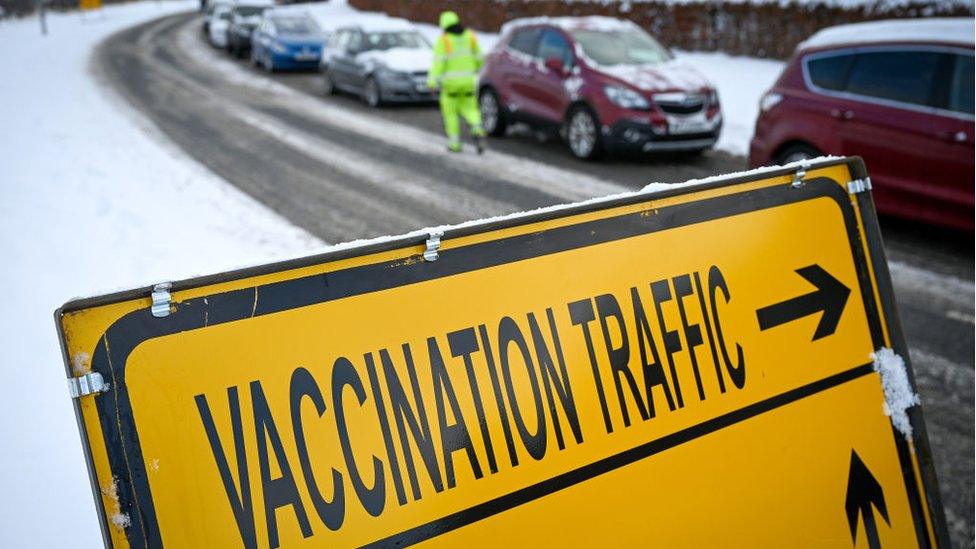Covid in Scotland: Vaccination programme 'may need to slow down'
- Published
- comments
Covid: Vaccine supplies could see roll-out 'slowdown'
Scotland's vaccination programme is likely to slow down later this month because of supply problems, the first minister has warned.
Nicola Sturgeon said a "temporary reduction" in Pfizer's manufacturing capacity meant the country had received slightly lower stocks of the vaccine than expected.
This means the number of vaccination appointments is likely to be reduced.
But Ms Sturgeon said Scotland is still on track to hit its vaccine targets.
And she said the country would be able to "rapidly accelerate" the vaccination programme again if supplies increase again.
A further 63,178 people had their first dose of the vaccine on Wednesday - the highest in a single day so far despite the bad weather - bringing the total in Scotland to 1,048,747.
The figure for the UK as a whole stands at more than 13 million.
Nearly a quarter (23%) of all adults in Scotland have had their first dose, including about 97% of over 80-year-olds, 87% of those aged between 75 and 79 and 54% of 70 to 74-year-olds.
Ms Sturgeon said the figures meant that Scotland had given the first dose to 75,000 more people than than had originally been expected by this stage.
And she said it gave "real hope" that the vaccine will soon start to have an impact on the number of people dying or becoming seriously ill with the virus.

A record number of people were vaccinated on Wednesday despite many parts of the country seeing extreme weather conditions
But she said the higher than expected take-up, alongside reduced supplies of the Pfizer jab and the need to preserve some stocks for second doses, meant that "we may need to reduce the number of appointments that we schedule over the next few weeks".
The first minister added: "This sort of issue is not unexpected, given the huge complexities that the vaccination programme throws up.
"Importantly, we remain on course to meet the key targets we have set out.
"And we still anticipate, subject to supply, that everyone over the age of 50 will have received their first dose by early May."
It was revealed last month that the UK was set to face short-term delays in delivery of the Pfizer jab as the pharmaceutical company upgraded its production capacity.
Pfizer is upscaling production at its plant in Puurs, Belgium, in efforts to produce more doses than originally planned for 2021 - temporarily reducing deliveries to all European countries.
The American firm said at the time that this would mean "fewer doses will be available for European countries at the end of January and the beginning of February."
If you can't see the lookup, click here, external
Scotland's health secretary, Jeane Freeman, told the BBC's Good Morning Scotland programme earlier on Thursday that the issue was "about the supply into the UK, it is not about distribution around the UK" and would therefore affect all four nations of the UK.
She added: "That will reduce our expected supply next week and the week after by about somewhere between 120,000 and 190,000 doses a week overall over the two vaccines."
But the UK government said it was "confident of our vaccine supply" and that it would be able to hit its target of vaccinating everyone in the top four priority groups by next Monday.
The prime minister's official spokesman said: "We are confident of supplies but we haven't commented on details of delivery schedules or movements of the vaccines."
And a spokeswoman from Northern Ireland's Department of Health said: "We are not aware of any Pfizer supply issues and are continuing to work through the priority groups as planned."
Meanwhile, the deaths of a further 48 people in Scotland who had previously tested positive for the virus have been recorded in the past 24 hours, bringing the total by that measure to 6,599.
However, only 4% of the tests carried out on Wednesday returned positive results - down from 4.8% the previous day.
The R number - effectively the rate at which the virus is transmitted - continues to be below one.
And the number of people in hospital wards with the virus has now fallen slightly below the peak from the first wave last year, with the number of patients in ICU units also gradually falling.


